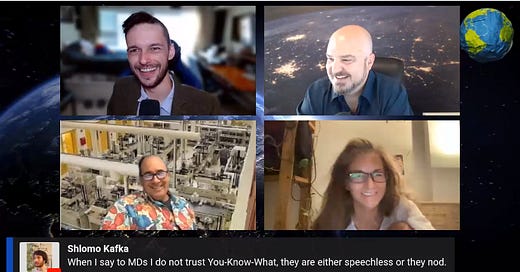RTE Roundtable Talk #12: Research Censorship (and a Solution!)
Featuring Kevin McKernan, PhD and Jessica Rose, PhD
"The Web as I envisaged it, we have not seen it yet. The future is still so much bigger than the past." -Tim Berners-Lee, inventor of the World Wide Web
We have begun to put together an organized list of our podcast episodes here.
I really enjoyed today's Roundtable Talk with Kevin and Jessica, who are on my short list of most interesting and brilliant people I've met during the plandemonium. We talk about papers each of them co-wrote with Dr. Peter McCullough that were held back from formal publication during the pandemic in different ways, corruption all over science, intellectual property, perverse economic incentives, paper mills (here and here are examples, and you might fairly wonder the extent to which they relate to setting up a medical authoritarian environment), and much more. We did not talk about the increasingly popular game of "Six Degrees of Peter McCullough" being played during lab lunch gatherings around the world.
The conversation eventually led to a proof-of-concept project in which Kevin published a genetic study of a cannabis plant onto the DASH blockchain. The entire process, including all data steps and images as well as peer review was all recorded on the blockchain, and the incentives were laid out to reward good participation at every level—the peer review process in particular. I strongly suspect that this is the seed for a larger movement. Cryptocurrency will, in some form, lay out a "trustless" environment that is transparent, and will return control of the scientific process to the scientists.
There was so much packed into today's conversation, and I feel humbled to have been a part of sharing it with the world. Please watch!
Since we spent most of the second half of our conversation talking about the blockchain approach to scientific publication, here is Kevin's fantastic presentation on that project.
I know Kevin and already really enjoyed my time talking with him, but this presentation gave me goosebumps. I watched it twice like I was watching an impactful slice of history. If this were a TED Talk, it would be in my top two along with Sir Ken Robinson's education talk, "Do Schools Kill Creativity?" (I am an educator after all). I would then throw 92% of the remainder of TED Talks into a dumpster and look around for an accelerant.
Please subscribe and help our channels grow. And share your favorite videos gratuitously. Command your friends to take a look. Be gentle, but persuasive. Or maybe just with those friends who might be most interested in each conversation. Twist some arms if you need to. It's for the greater good. It's for…The Science.
And it's safe. And effective.
You can watch us live on most Tuesdays at 1 PM Eastern, or watch us separately on Mondays or Fridays at 1 PM Eastern. The RTE podcast is on numerous platforms including Rumble, YouTube, Bitchute, Odysee, Stitcher, Spotify, Apple, RokFin, and some other places that Liam knows better about than I do. You can also visit our sponsors. Written transcripts will be available for paid subscribers at randomly delayed dates. We thank all of our supporters and hope that you get something excellent out of each discussion.
YouBoob has begun censoring us, so we are more focused on Rumble for the moment, but also the other options above. Some of our videos have been restricted (YouBoob again), however.
You can also find us here on Telegram.





Just throwing this out there--it would be interesting to see if a block chain model might enable everyday citizens to groupfund publication of important (underrepresented) science. It would be an incredible change of perspective where silenced research and study could find a voice, supported by a concerned public.
"I would then throw 92% of the remainder of TED Talks into a dumpster and look around for an accelerant."
I have rarely understood the hype about TED talks. So thank you for this comment.